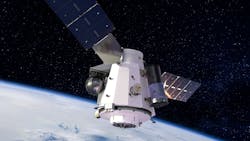Pentagon picks Sierra Nevada Corp. to build unmanned orbiting space station for experiments in microgravity
CAMBRIDGE, Mass. – The U.S. Defense Innovation Unit in Cambridge, Mass., the Pentagon's advocate for fast use of emerging commercial technologies, has awarded Sierra Nevada Corp. in Sparks, Nev., a contract to build an unmanned orbiting space station. C4ISRnet reports. Continue reading original article
The Military & Aerospace Electronics take:
29 July 2020 -- The unmanned orbital outpost will be placed in low-Earth orbit (LEO) for experiments and demonstrations. The autonomous, free flying vehicle will be able to host payloads and support space assembly and manufacturing, microgravity experimentation, logistics, training, testing, and evaluations.
Sierra Nevada experts will repurpose their company's Shooting Star transport vehicle into a scalable, autonomous space station for experiments and demonstrations.
The Shooting Star vehicle is a 16-foot attachment to the company’s Dream Chaser space plane. While the outpost will operate in low-Earth orbit (LEO), future orbits could be placed in other orbits, including cislunar.
Related: Heinlein Trust, SpaceX debut competition to promote innovation in zero gravity
Related: It's not your father's Space Shuttle any more
John Keller, chief editor
Military & Aerospace Electronics
